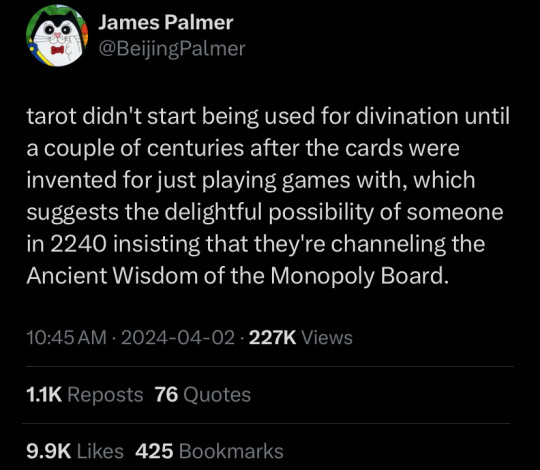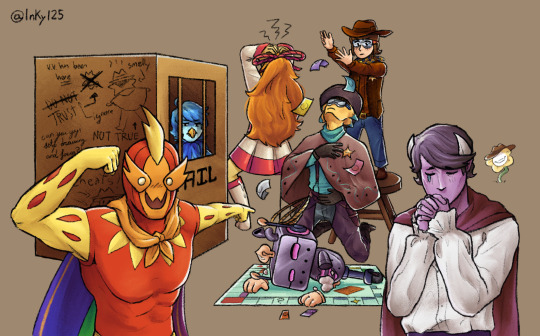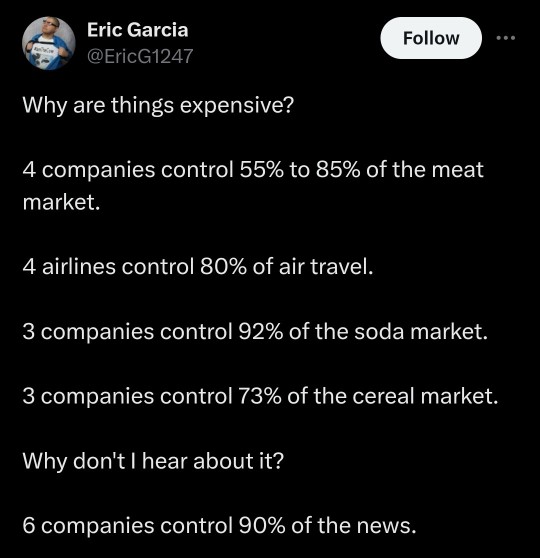#monopoly
Text

this is for the 14 people in the Yo-kai watch fandom
(I love Blandon so much) he's beating you in monopoly and he's being smug about it
also i have like the first 6 or so books of the manga and i adore him vvv

#yo kai watch#yo -kai#blandon#yokai watch#yokai watch fanart#yokai watch manga#my fanart#digital art#digital drawing#low profile#monopoly#just a little guy#i love him so much
75 notes
·
View notes
Text
“If buying isn’t owning, piracy isn’t stealing”

20 years ago, I got in a (friendly) public spat with Chris Anderson, who was then the editor in chief of Wired. I'd publicly noted my disappointment with glowing Wired reviews of DRM-encumbered digital devices, prompting Anderson to call me unrealistic for expecting the magazine to condemn gadgets for their DRM:
https://longtail.typepad.com/the_long_tail/2004/12/is_drm_evil.html
I replied in public, telling him that he'd misunderstood. This wasn't an issue of ideological purity – it was about good reviewing practice. Wired was telling readers to buy a product because it had features x, y and z, but at any time in the future, without warning, without recourse, the vendor could switch off any of those features:
https://memex.craphound.com/2004/12/29/cory-responds-to-wired-editor-on-drm/
I proposed that all Wired endorsements for DRM-encumbered products should come with this disclaimer:
WARNING: THIS DEVICE’S FEATURES ARE SUBJECT TO REVOCATION WITHOUT NOTICE, ACCORDING TO TERMS SET OUT IN SECRET NEGOTIATIONS. YOUR INVESTMENT IS CONTINGENT ON THE GOODWILL OF THE WORLD’S MOST PARANOID, TECHNOPHOBIC ENTERTAINMENT EXECS. THIS DEVICE AND DEVICES LIKE IT ARE TYPICALLY USED TO CHARGE YOU FOR THINGS YOU USED TO GET FOR FREE — BE SURE TO FACTOR IN THE PRICE OF BUYING ALL YOUR MEDIA OVER AND OVER AGAIN. AT NO TIME IN HISTORY HAS ANY ENTERTAINMENT COMPANY GOTTEN A SWEET DEAL LIKE THIS FROM THE ELECTRONICS PEOPLE, BUT THIS TIME THEY’RE GETTING A TOTAL WALK. HERE, PUT THIS IN YOUR MOUTH, IT’LL MUFFLE YOUR WHIMPERS.
Wired didn't take me up on this suggestion.
But I was right. The ability to change features, prices, and availability of things you've already paid for is a powerful temptation to corporations. Inkjet printers were always a sleazy business, but once these printers got directly connected to the internet, companies like HP started pushing out "security updates" that modified your printer to make it reject the third-party ink you'd paid for:
https://www.eff.org/deeplinks/2020/11/ink-stained-wretches-battle-soul-digital-freedom-taking-place-inside-your-printer
Now, this scam wouldn't work if you could just put things back the way they were before the "update," which is where the DRM comes in. A thicket of IP laws make reverse-engineering DRM-encumbered products into a felony. Combine always-on network access with indiscriminate criminalization of user modification, and the enshittification will follow, as surely as night follows day.
This is the root of all the right to repair shenanigans. Sure, companies withhold access to diagnostic codes and parts, but codes can be extracted and parts can be cloned. The real teeth in blocking repair comes from the law, not the tech. The company that makes McDonald's wildly unreliable McFlurry machines makes a fortune charging franchisees to fix these eternally broken appliances. When a third party threatened this racket by reverse-engineering the DRM that blocked independent repair, they got buried in legal threats:
https://pluralistic.net/2021/04/20/euthanize-rentier-enablers/#cold-war
Everybody loves this racket. In Poland, a team of security researchers at the OhMyHack conference just presented their teardown of the anti-repair features in NEWAG Impuls locomotives. NEWAG boobytrapped their trains to try and detect if they've been independently serviced, and to respond to any unauthorized repairs by bricking themselves:
https://mamot.fr/@[email protected]/111528162905209453
Poland is part of the EU, meaning that they are required to uphold the provisions of the 2001 EU Copyright Directive, including Article 6, which bans this kind of reverse-engineering. The researchers are planning to present their work again at the Chaos Communications Congress in Hamburg this month – Germany is also a party to the EUCD. The threat to researchers from presenting this work is real – but so is the threat to conferences that host them:
https://www.cnet.com/tech/services-and-software/researchers-face-legal-threats-over-sdmi-hack/
20 years ago, Chris Anderson told me that it was unrealistic to expect tech companies to refuse demands for DRM from the entertainment companies whose media they hoped to play. My argument – then and now – was that any tech company that sells you a gadget that can have its features revoked is defrauding you. You're paying for x, y and z – and if they are contractually required to remove x and y on demand, they are selling you something that you can't rely on, without making that clear to you.
But it's worse than that. When a tech company designs a device for remote, irreversible, nonconsensual downgrades, they invite both external and internal parties to demand those downgrades. Like Pavel Chekov says, a phaser on the bridge in Act I is going to go off by Act III. Selling a product that can be remotely, irreversibly, nonconsensually downgraded inevitably results in the worst person at the product-planning meeting proposing to do so. The fact that there are no penalties for doing so makes it impossible for the better people in that meeting to win the ensuing argument, leading to the moral injury of seeing a product you care about reduced to a pile of shit:
https://pluralistic.net/2023/11/25/moral-injury/#enshittification
But even if everyone at that table is a swell egg who wouldn't dream of enshittifying the product, the existence of a remote, irreversible, nonconsensual downgrade feature makes the product vulnerable to external actors who will demand that it be used. Back in 2022, Adobe informed its customers that it had lost its deal to include Pantone colors in Photoshop, Illustrator and other "software as a service" packages. As a result, users would now have to start paying a monthly fee to see their own, completed images. Fail to pay the fee and all the Pantone-coded pixels in your artwork would just show up as black:
https://pluralistic.net/2022/10/28/fade-to-black/#trust-the-process
Adobe blamed this on Pantone, and there was lots of speculation about what had happened. Had Pantone jacked up its price to Adobe, so Adobe passed the price on to its users in the hopes of embarrassing Pantone? Who knows? Who can know? That's the point: you invested in Photoshop, you spent money and time creating images with it, but you have no way to know whether or how you'll be able to access those images in the future. Those terms can change at any time, and if you don't like it, you can go fuck yourself.
These companies are all run by CEOs who got their MBAs at Darth Vader University, where the first lesson is "I have altered the deal, pray I don't alter it further." Adobe chose to design its software so it would be vulnerable to this kind of demand, and then its customers paid for that choice. Sure, Pantone are dicks, but this is Adobe's fault. They stuck a KICK ME sign to your back, and Pantone obliged.
This keeps happening and it's gonna keep happening. Last week, Playstation owners who'd bought (or "bought") Warner TV shows got messages telling them that Warner had walked away from its deal to sell videos through the Playstation store, and so all the videos they'd paid for were going to be deleted forever. They wouldn't even get refunds (to be clear, refunds would also be bullshit – when I was a bookseller, I didn't get to break into your house and steal the books I'd sold you, not even if I left some cash on your kitchen table).
Sure, Warner is an unbelievably shitty company run by the single most guillotineable executive in all of Southern California, the loathsome David Zaslav, who oversaw the merger of Warner with Discovery. Zaslav is the creep who figured out that he could make more money cancelling completed movies and TV shows and taking a tax writeoff than he stood to make by releasing them:
https://aftermath.site/there-is-no-piracy-without-ownership
Imagine putting years of your life into making a program – showing up on set at 5AM and leaving your kids to get their own breakfast, performing stunts that could maim or kill you, working 16-hour days during the acute phase of the covid pandemic and driving home in the night, only to have this absolute turd of a man delete the program before anyone could see it, forever, to get a minor tax advantage. Talk about moral injury!
But without Sony's complicity in designing a remote, irreversible, nonconsensual downgrade feature into the Playstation, Zaslav's war on art and creative workers would be limited to material that hadn't been released yet. Thanks to Sony's awful choices, David Zaslav can break into your house, steal your movies – and he doesn't even have to leave a twenty on your kitchen table.
The point here – the point I made 20 years ago to Chris Anderson – is that this is the foreseeable, inevitable result of designing devices for remote, irreversible, nonconsensual downgrades. Anyone who was paying attention should have figured that out in the GW Bush administration. Anyone who does this today? Absolute flaming garbage.
Sure, Zaslav deserves to be staked out over an anthill and slathered in high-fructose corn syrup. But save the next anthill for the Sony exec who shipped a product that would let Zaslav come into your home and rob you. That piece of shit knew what they were doing and they did it anyway. Fuck them. Sideways. With a brick.
Meanwhile, the studios keep making the case for stealing movies rather than paying for them. As Tyler James Hill wrote: "If buying isn't owning, piracy isn't stealing":
https://bsky.app/profile/tylerjameshill.bsky.social/post/3kflw2lvam42n

If you'd like an essay-formatted version of this post to read or share, here's a link to it on pluralistic.net, my surveillance-free, ad-free, tracker-free blog:
https://pluralistic.net/2023/12/08/playstationed/#tyler-james-hill

Image:
Alan Levine (modified)
https://pxhere.com/en/photo/218986
CC BY 2.0
https://creativecommons.org/licenses/by/2.0/
#pluralistic#playstation#sony#copyright#copyfight#drm#monopoly#enshittification#batgirl#road runner#financiazation#the end of ownership#ip
23K notes
·
View notes
Text

5K notes
·
View notes
Text

My own stupid-ass way of celebrating our long-awaited ownership of Mickey Mouse.
Yes, I'm a Nimona fan, shut up y'all.
#tumblr memes#public domain#mickey mouse#steamboat willie#fuck disney#nimona#nimona my beloved#fuck copyright#copyright law#monopoly#copyright#disney#nimona 2023#nimona movie#memes
4K notes
·
View notes
Text

here's another. i think jason and damian are interchangable
#monopoly#batfam#batfamily#jason todd#dick grayson#tim drake#cassandra cain#barbara gordon#stephanie brown#damian wayne#duke thomas#alignment chart
10K notes
·
View notes
Text
1K notes
·
View notes
Text

2K notes
·
View notes
Text
Has anyone ever made a Monopoly board that is adjusted for inflation?
1K notes
·
View notes
Text
Not a single thing in Dark Souls or Fallout or The Outer Wilds is on the same level of sheer environmental storytelling as the wording of the "Go to Jail" Community Chest card in Monopoly.
5K notes
·
View notes
Text
GO DIRECTLY TO JAIL!
Do not pass go!
Do not cum!
Do not collect 200$!
650 notes
·
View notes
Text
No fandom is complete without their own version of the monopoly Draw Your Squad template
So I had to do it

#undertale yellow#draw your squad#el bailador#fanart#my art inky125#ceroba uty#starlo uty#uty dalv#clover uty#flowey uty#uty martlet#axis uty#monopoly#meme
625 notes
·
View notes
Text

To quote the infamous Roman Roy: Bro, literally all you know about jail is when you played monopoly.
934 notes
·
View notes
Text

Why are things expensive?
4 companies control 55% to 85% of the meat market.
4 airlines control 80% of air travel.
3 companies control 92% of the soda market.
3 companies control 73% of the cereal market.
Why don't I hear about it?
6 companies control 90% of the news.
#capitalism#monopoly#cost of living#gst#tax#expensive#eat the rich#eat the fucking rich#ausgov#politas#auspol#tasgov#taspol#australia#fuck neoliberals#neoliberal capitalism#anthony albanese#albanese government#extortion#anti capitalist#capitalist hell#capitalist dystopia#capitalist bullshit#class war#oppression#oppressor#repression#free all oppressed peoples#pedagogy of the oppressed#oppressive
380 notes
·
View notes
Video
youtube
How Amazon Is Ripping You Off
Shopping on Amazon? Stop! Watch this first.
Amazon is the world’s biggest online retailer. This one single juggernaut of a company is responsible for nearly 40% of all online sales in America. In an FTC lawsuit, they’re accused of using their mammoth size, and consumers’ dependence on them, to artificially jack up prices as high as possible, while prohibiting sellers on Amazon from charging lower prices anywhere else.
They’re accused of using a secret algorithm, codenamed "Project Nessie," to charge customers an estimated extra $1 billion dollars,
If this isn’t an abuse of power that hurts consumers, what is? So much for all of those “prime” deals you thought you were getting.
Project Nessie isn’t the only trick Amazon has been accused of using to exert its hulking dominance over the online retail industry — leading to higher prices for you.
Much of the FTC’s antitrust lawsuit centers around the treatment of independent merchants who sell items on Amazon’s online superstore — accounting for 60 percent of Amazon's sales.
Amazon allegedly uses strongarm tactics that force these sellers to keep their prices higher than they need to be. Like barring them from selling products for significantly less at other stores — or else risk being hidden in Amazon’s search results or having their sales stopped entirely.
And Amazon is accused of engaging in pay-to-play schemes and charging merchants excessive fees that end up costing you even more.
Independent sellers are effectively forced to pay Amazon to advertise their products prominently in search results. If they don’t fork over cash, then their products get buried underneath products of companies who do. This hurts sellers but also harms shoppers who have to parse through less relevant products that may be more expensive or lower quality.
And to be eligible for the coveted “Prime” badge on their items — which is considered crucial for competing on the platform — independent sellers are pushed into paying Amazon for additional services like warehousing and shipping, even if they could get those services cheaper elsewhere. If sellers forgo trying to qualify for Prime, their goods apparently become harder for customers to find.
When all of these extra fees are added up, Amazon takes around a 50 percent cut of each sale made by a third party. It’s projected that Amazon will earn around $125 billion from collecting fees in the U.S. in 2023, most of which get passed on to you.
By charging all of these extra fees and stifling independent companies from selling their products for less elsewhere, Amazon is using its dominance to essentially set prices for all consumers across the internet.
And when you combine Amazon’s control of ecommerce with all of the other industries it has entered by gobbling up companies — such as Whole Foods, One Medical, and MGM — you’re left with a behemoth that simply has too much power.
This is all part of a much larger problem of growing corporate dominance in America. In over 75% of U.S. industries, fewer companies now control more of their markets than they did twenty years ago.
The lack of competition and consumer choice has resulted in all of us paying more for goods because corporations like Amazon can raise their prices with impunity. By one estimate, corporate concentration has cost the typical American household $5,000 a year more than they would have spent if markets were truly competitive.
This power isn’t just being used to siphon more money from you. A giant corporation has the power to bust unions, keep workers’ wages low, and funnel money into our political system.
It’s a vicious cycle, making giant corporations more and more powerful.
But under the Biden administration, the government is making a strong effort to revive antitrust law and use its power to reign in big corporations that have grown too powerful.
We must stop the monopolization of America. This FTC lawsuit against Amazon is a great start.
522 notes
·
View notes
Text
I was playing Monopoly with my mum, lost, and then woke up crying.
223 notes
·
View notes
Text
Monopoly part 2!!! With help from @loreensdarling !

Poor Shin never stood a chance 😔
#star wars#shin hati#ahsoka#sabine wren#art#fanart#digital art#wolfwren#baylan skoll#ezra bridger#hera syndulla#morgan elsbeth#monopoly
375 notes
·
View notes